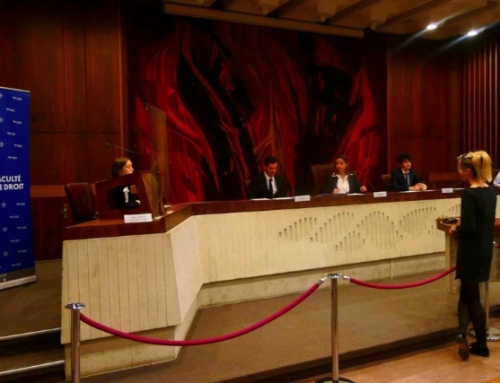The issue of digital sovereignty is at the heart of debate in many areas, and goes far beyond the simple problem of access to French people’s personal data. However, this issue is even more crucial as the world becomes increasingly dependent on digital technology, through our natural appetite for digital tools that facilitate exchanges and access to information of all kinds.
The recent global pandemic has underlined the importance of our digital uses, and their essential availability has enabled us to maintain and guarantee a satisfactory level of education. France’s higher education sector, for example, has demonstrated tremendous agility in transforming its model by rapidly offering distance learning and hybrid teaching methods. Certain tools, already used by a large number of professionals, were quickly adopted by a large majority of teachers and learners to continue their activities at home and elsewhere.
But what kind of digital sovereignty are we talking about ?
During his hearing in May 2021 with the parliamentary information mission chaired by Mr. Philippe Latombe, Mr. Mehdi Gharsallah, strategic advisor to the DGESIP (Direction Générale de l’Enseignement Supérieur et de l’Insertion Professionnelle of the French Ministry of Higher Education, Research and Innovation) clarified the various fields of application of this sovereignty. Mr. Gharsallah acknowledges that: “The battle over operating systems also seems to me to be generally lost, except perhaps at the margins”, before adding that network infrastructures are largely under our control. Furthermore, he notes: “The power of Amazon Web Services (AWS) and Microsoft in the field of data centers, at the end of these networks we’ve just mentioned, seems obvious. However, we can still resist them, thanks to European players such as OVHCloud and university research data centers, accredited by the French Ministry of Higher Education, Research and Innovation (MESRI). These players can and must help to rebalance the forces at work.”
In the opinion of the strategic advisor for digital technology, it is important not to restrict use to emergency responses to covid-19, and thus to the use of distance learning solutions. One of the keys to sovereignty lies in the production and distribution of educational content. “Today, France – and this is less true of Europe as a whole – is a very good pupil when it comes to producing free digital educational resources. We began investing in this field very early on, around ten years ago. To date, there are between 35,000 and 40,000 open educational resources in France, fully accessible to anyone wishing to learn online. There are also, of course, resources specific to certain teachers or establishments, who do not share them. These eloquent figures are the result of a succession of incentive policies”, confirms Mehdi Gharsallah. That’s where the main challenges lie. Producing and distributing content independently remains essential. This raises the question of the platforms that store this content, and in parallel, those that enable its use by the establishments and audiences concerned.

If France, through its higher education institutions, is the “owner” of content, what about LMSs (Learning Management Systems) ? Because, as the strategic advisor on digital issues points out: “Current sovereignty issues mainly concern these platforms. The aim is to rebalance the balance of power with the American giants, whose algorithms are fed by our data, although this remark hardly applies to higher education data.”
In this context, it’s worth remembering that almost 9 out of 10 French people are worried about the way their data is handled, and fear cyber-attacks (according to an IFOP survey in March 2022). 92% of French people expect the President of the Republic to reinforce the cyber-security of public bodies as a priority. If we take into account the terrible fact that 4 out of 10 French people have already been hacked, it’s easy to understand why 93% of them express the fear of having their personal data stolen.
Yet recent news is teeming with alerts launched by the media around security flaws that make our data vulnerable, or on numerous cases of fraudulent use of our relative consents (including when we are supposed to be protected by the RGPD). Two recent examples to illustrate this anxiety-provoking situation, which affects the world of education by ricochet:
- In an article published by 20 Minutes last March, we learned that a Dublin-based computer researcher had discovered that Google could “transmit part of users’ personal data to its servers without any consent having been given. The data transmitted by Google Messages includes a hash of the message body, which makes it possible to link the sender and recipient in the message exchange”, explains Douglas Leith.
- In another article relayed by Fnac on April 19, we discover that Intel and Class Technologies have developed an Artificial Intelligence tool that analyzes the emotions of students attending a remote course, via their computer’s camera. Facial recognition then enables “discreet” monitoring of students, and in particular their attention levels, but the software also records their personal data. A data leak from a similar platform affected some 400,000 students in 2020.
Fortunately – but would this be enough to reassure us – the regulatory bodies are vigilant, and are trying to force the net giants to be more cautious and respectful of each other. For example, the CNIL, the guardian of French digital privacy, has criticized Google.fr and Amazon.fr for the practice of placing advertising trackers on Internet users’ computers “without their prior consent”. Heavy fines of 100 and 35 million euros respectively were imposed. All the more so as this breach of ethics by the American players who clearly dominate online advertising, reminds the Cnil, “infringes on the privacy of Internet users in their daily digital lives by collecting a great deal of information about people, without their consent, in order to subsequently be able to offer them advertising”.
One imagines that this kind of practice would be even harder to tolerate in higher education. And yet, digital technology, the platforms on which students (and teachers) leave personal traces, information that belongs to them and that they do not wish to see leaked, are being used more and more widely. By whom and for what? Improving the experience is an acceptable ambition, as long as it doesn’t infringe personal rights.

So how can we guarantee maximum security? Is sovereignty a possible answer in the near future? Are we going to have to legislate on this issue again?
On the occasion of International Personal Data Day, January 28, 2022, Vincent Gautrais, Director of the Centre de recherche en droit public at the Université de Montréal, commented: “Laws have always categorized data with a greater or lesser degree of ‘risk of harm’, i.e. personal data and sensitive personal data. Obviously, the latter benefit from greater protection. The problem is that with digital technology, even “innocuous” data, when coupled with other data, can become sensitive. So the issue is becoming increasingly complex.” And if the confidentiality of information should be a red line not to be crossed, it would undoubtedly be preferable if our data did not circulate outside our borders. Remembering that “confidentiality is the idea that information, in this case personal information, is not available to a person not authorized to access it”, as Nicolas Vermey, a specialist lawyer and speaker for the Université de Montréal, put it, is not trivial.
The data needed to ensure the smooth running of higher education establishments, to improve the student experience and to innovate in terms of pedagogy, are sensitive data. Indeed, they undoubtedly enhance the overall quality of the French education system. In a way, their use and exploitation impose a real sovereignty, the importance of which should be appreciated by all. It was with this concern in mind that Cédric O, Secretary of State for Digital Affairs, presented a plan to support the French cloud last November. This plan clearly includes the need to train future engineers, in particular, on French tools. In France, two companies stand out for their initiative in this direction: Stormshield, an Airbus subsidiary specializing in cybersecurity, and Outscale, a Dassault Systèmes subsidiary dedicated to the cloud.
Training, educating and developing the tools that will guarantee a sufficient level of digital sovereignty for our country logically depends on the ability of our higher education system to embrace the issue holistically. It is this sovereignty that will guarantee the future originality and durability of our system, beyond the domination of certain global players in the digital world.
To find out more, read our article on the role of open source in universities !






